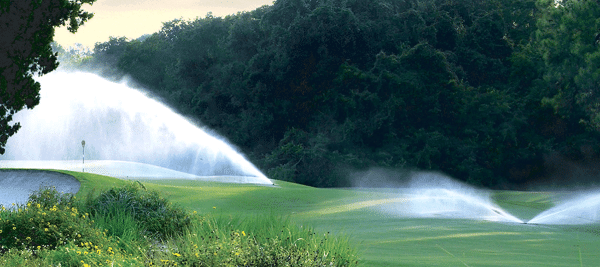Compressed air, sprinklers, blowing out sprinklers, water lines, irrigation lines and so on. That is what this page is all about.
Damage to a sprinkler pipe can occur when that pipe remains partially, or full of water during the cold winter months. Frost moves into the ground freezing it rock solid. Water expands as it freezes. If the there is no place for the forming and expanding ice in the sprinkler pipe to go, the expansion is powerful enough to rupture the sprinkler pipe.
Next spring the frost comes out of the ground as the ground thaws in the spring sun, the ice in the sprinkler line melts, you turn on the sprinkler supply faucet, and your water is flowing out of the split sprinkler line, into the ground, and you may not even know it; that is, until you get your water bill!

Not blowing out your sprinkler lines before the ground freezes each year means the potential for wasted water, and a much more troublesome and costly project in finding, digging up and repairing broken sprinkler or irrigation water lines.
If you’re blasting high volume, low pressure compressed air into the sprinkler line at the highest point, and the drain is at the lowest point in the sprinkler run, then as long as there’s nothing but mist coming out the drain end – after all the free water that had been filling the pipe had been blown down to and out of the outlet – then any small amount of water in the lines shouldn’t present a freezing hazard.
In blowing out the lines of compressed air sprinklers, usually it is the volume of air and not necessarily the pressure of the compressed air that does the trick.
You can make your own air line – to water faucet adapter as shown.

How much compressed air for blowing out sprinklers?
Want to figure out home much air you need to blow out your sprinklers? Thanks to Mike of Grand Junction Pipe & Supply in Grand Junction Colorado who tells us:
“The following equation should be used to figure out the proper volume of air needed for your system.
The size of the compressor needed should be based on this equation.
This is based on Cubic Feet per Minute (CFM’s) and the Gallons Per Minute (GPM’s) for which your system is designed.”
GPM of your system divided it by 7.5
If you take the GPM of your system, and divide it by 7.5 it equals the CFM you’ll need to push the water out.
Mike goes on to say that if your system flows 20 GPM of water at 30 PSI, then you divide the 20 GPM by 7.5 to get the CFM necessary to adequately blow out your lines. In this example the answer is 2.66 CFM
You will need a compressor able to provide a flow of 2.66 CFM at 30 PSI to get all the water out, or a reservoir with enough volume of air already compressed to generate that flow.
Got an issue with blowing out sprinklers, or winterizing water lines for home, cottage or RV? I do get a lot of questions about this issue. So many that I decided it was time to have a page with questions and answers for all of the folks looking for information on what to do, and what not to do, about blowing out sprinklers etc.
Blowing out sprinklers before the deep freeze arrives is important. You need to be able to connect an air supply to the sprinkler lines at the highest point of them, and open the line at the lowest point. By flowing compressed air at relatively low pressure but high volume into the lines, all water will be driven before the air and out the drain end.
